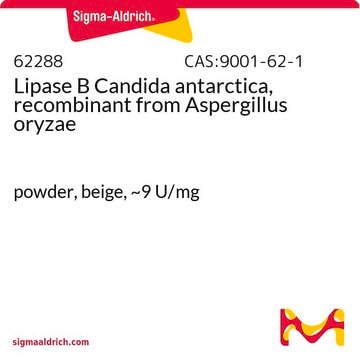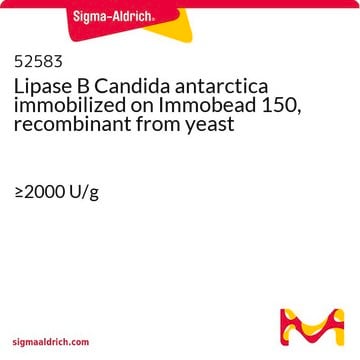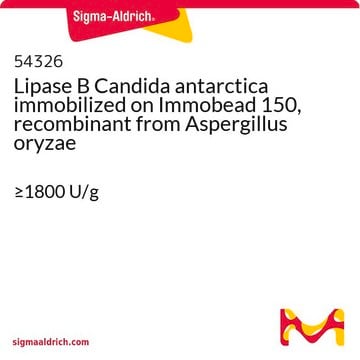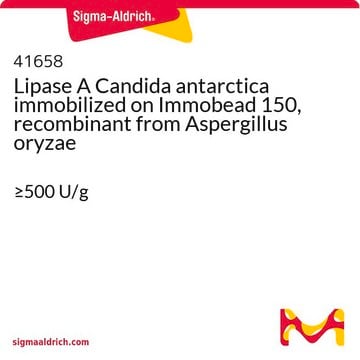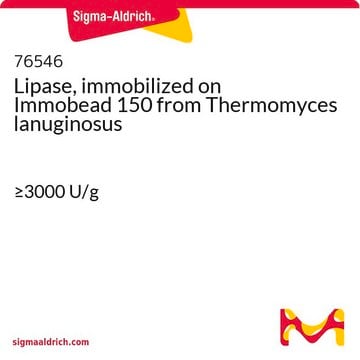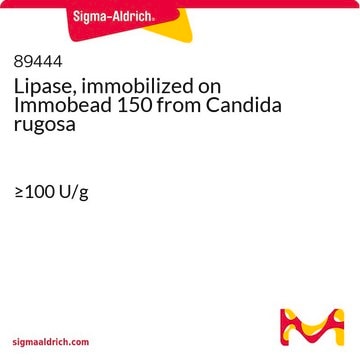73940
Lipase immobilized from Candida antarctica
beads, slightly brown, >2 U/mg
Synonym(s):
Immobilized Lipase, Lipase Enzyme
Sign Into View Organizational & Contract Pricing
All Photos(1)
About This Item
EC Number:
MDL number:
UNSPSC Code:
12352204
NACRES:
NA.54
Recommended Products
form
beads
specific activity
>2 U/mg
color
slightly brown
density
2 g/mL at 20 °C
storage temp.
2-8°C
General description
Lipases belong to the class of hydrolases. Microbes of plant and animal basis mainly produce lipase enzyme. It can also be produced by marine organisms.
Application
Lipases are used industrially for the resolution of chiral compounds and the transesterification production of biodiesel.
Biochem/physiol Actions
Lipases are used in detergent, food, leather, pharmaceutical and dairy industries. It has several characteristics like substrate specificity, stereospecificity and regioselectivity. It also participates in various bioconversion reactions like, hydrolysis, esterification, acidolysis and aminolysis.
Lipases catalyze the hydrolysis of triacylglycerols into glycerol and free fatty acids.
Unit Definition
1 U corresponds to the amount of enzyme which liberates 1 μmol butyric acid per minute at pH 8.0 and 40°C (tributyrin, Cat. No. 91010, as substrate)
Signal Word
Danger
Hazard Statements
Precautionary Statements
Hazard Classifications
Resp. Sens. 1
Storage Class Code
11 - Combustible Solids
WGK
WGK 1
Flash Point(F)
Not applicable
Flash Point(C)
Not applicable
Personal Protective Equipment
dust mask type N95 (US), Eyeshields, Gloves
Certificates of Analysis (COA)
Search for Certificates of Analysis (COA) by entering the products Lot/Batch Number. Lot and Batch Numbers can be found on a product’s label following the words ‘Lot’ or ‘Batch’.
Already Own This Product?
Find documentation for the products that you have recently purchased in the Document Library.
Customers Also Viewed
Lipase: An Industrial Enzyme Through Metagenomics
Lipase: An Industrial Enzyme Through Metagenomics (2018)
Marine fungal and bacterial isolates for lipase production: A comparative study
Advances in Food and Nutrition Research, 78, 71-94 (2016)
J Hall et al.
The Journal of small animal practice, 54(5), 275-279 (2013-02-13)
Mushroom toxicosis is rarely diagnosed in dogs and is poorly reported in the veterinary literature. This report suggests that mushroom toxicosis is a potentially under-diagnosed condition in first opinion practice in the UK. Nine dogs with clinical signs consistent with
Minshan Hu et al.
Advances in clinical and experimental medicine : official organ Wroclaw Medical University, 21(6), 751-757 (2013-03-05)
Diet induces changes in plasma lipid profiles, and the plasma lipid profiles vary among different genetic backgrounds. The aim of this study was to investigate how a high-carbohydrate (high-CHO) diet interacts with hepatic lipase G-250A promoter polymorphism to affect the
Stephen G Young et al.
Genes & development, 27(5), 459-484 (2013-03-12)
All organisms use fatty acids (FAs) for energy substrates and as precursors for membrane and signaling lipids. The most efficient way to transport and store FAs is in the form of triglycerides (TGs); however, TGs are not capable of traversing
Articles
Efficient epimerization catalyst for enzyme mediated dynamic kinetic resolution (DKR).
Our team of scientists has experience in all areas of research including Life Science, Material Science, Chemical Synthesis, Chromatography, Analytical and many others.
Contact Technical Service
